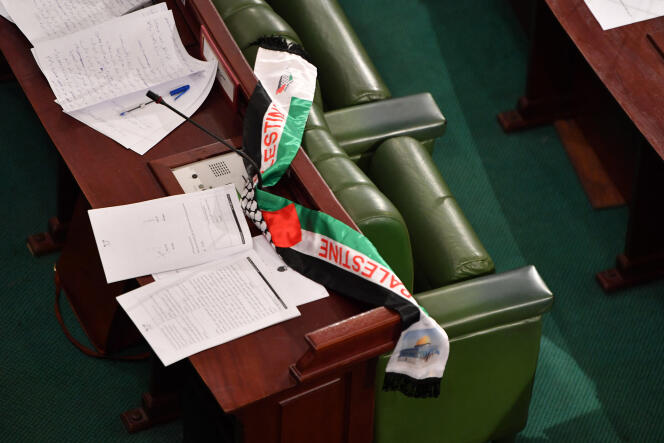


Notorious for being a master of outraged outbursts, Kais Saied is not in the habit of showing restraint. The Tunisian president, known to espouse conspiracy theories with anti-Semitic overtones, ended up making an exception when it came to the most sensitive issue of the day. After allowing a bill criminalizing relations with the Jewish state to pass through committee in the Assembly of the Representatives of the People (ARP), he made an abrupt U-turn. As the bill went before members of parliament in a hectic plenary session on Thursday, November 2, the head of state declared his opposition to it, despite the support of a majority of MPs. Following his speech, the president of the Assembly of the Representatives of the People (ARP), Brahim Bouderbala, also withdrew his support.
In a solemn message to the Tunisian people – a rare exercise for President Saied – he declared that Tunisia was "in a war of liberation, not criminalization." He argued – in a somewhat acrobatic fashion – that it was counter-productive to criminalize relations with an "entity" that Tunis does not recognize, and that any attempt to collaborate with Israel would be considered "high treason," according to article 60 of the penal code, which provides for the death penalty for any Tunisian found guilty of communicating intelligence with a foreign power.
According to the head of state, adopting this new bill would be a threat "to Tunisia's external security," as reported by the president of the ARP. Just a few days earlier, Minister of Foreign Affairs Nabil Ammar had himself tried to calm parliamentarians' ardor, calling on them to "study the repercussions" of the bill and to take "time" to examine it.
Was this bill just another provocation? Was it unenforceable, or too fraught with consequences for the president to oppose? The bill called for a sentence of up to 12 years' imprisonment – and life imprisonment in the event of a repeat offense – against any person of Tunisian nationality who maintained relations with "the Zionist entity [...] which calls itself Israel." The concept of "normalization" was intended to cover any form of "deliberate" communication, cooperation or commercial relationship, "directly or indirectly," with Israeli natural or legal persons, with the exception of Palestinians with Israeli nationality.
According to some members of parliament, Saied's actions were dictated by the interests of foreign powers. Various members of parliament who had supported the head of state in his administration since his self-coup on July 25, 2021, expressed their disagreement with the president and accused Bouderbala of caving in to pressure from the United States. Citing the existence of "official correspondence from the US Embassy in Tunis addressed to the Ministry of Foreign Affairs," Mohamed Ali, an MP and the rapporteur for the Rights and Freedoms Committee (responsible for examining the bill before it went to the plenary session), claimed that Washington had threatened "economic and military sanctions" if the bill were passed.
Speaking to Diwan FM radio, another MP, Bilel El Mechri, also called on the ARP president to "clarify his position" and "reveal the content of his almost daily telephone conversations with Joey Hood, the US ambassador." "Ultimately, there is no "will of the people" [president's slogan during the 2019 presidential election] or anything. Only the will of Kais Saied and his electoral interests prevail," blasted Hichem Ajbouni, executive of the opposition party Courant démocrate.
According to one Tunis-based diplomatic source, "it is a natural thing for foreign ministries to express their concern," although there is no indication of "pressure" against a bill that could have a negative impact on tourism in Tunisia, particularly during the annual Jewish pilgrimage to the Ghriba synagogue – which Israeli nationals can visit despite the absence of diplomatic relations with the Jewish state – in addition to putting further strain on the country's economy.
This is not the first time that a bill to criminalize relations with Israel has been tabled before the ARP. In 2015, MPs from the Popular Front, a coalition of left-wing and far-left parties, had tabled a presented a bill along these lines, but it went no further. Since then, the debate on the need to legislate on the issue has returned regularly, punctuated by current events linked to the Israeli-Palestinian conflict.
Having been overruled by the president in its first real attempt to exercise legislative power, Parliament has emerged divided and further weakened by the fact that the Constitution, tailor-made by Saied to endow himself with extensive powers, leaves MPs very little room for maneuver. Saied had already warned parliamentarians at the inaugural session on March 13, reminding them that their terms could be revoked by the electorate after one year in office, according to the provisions of the constitution.
Translation of an original article published in French on lemonde.fr; the publisher may only be liable for the French version.
